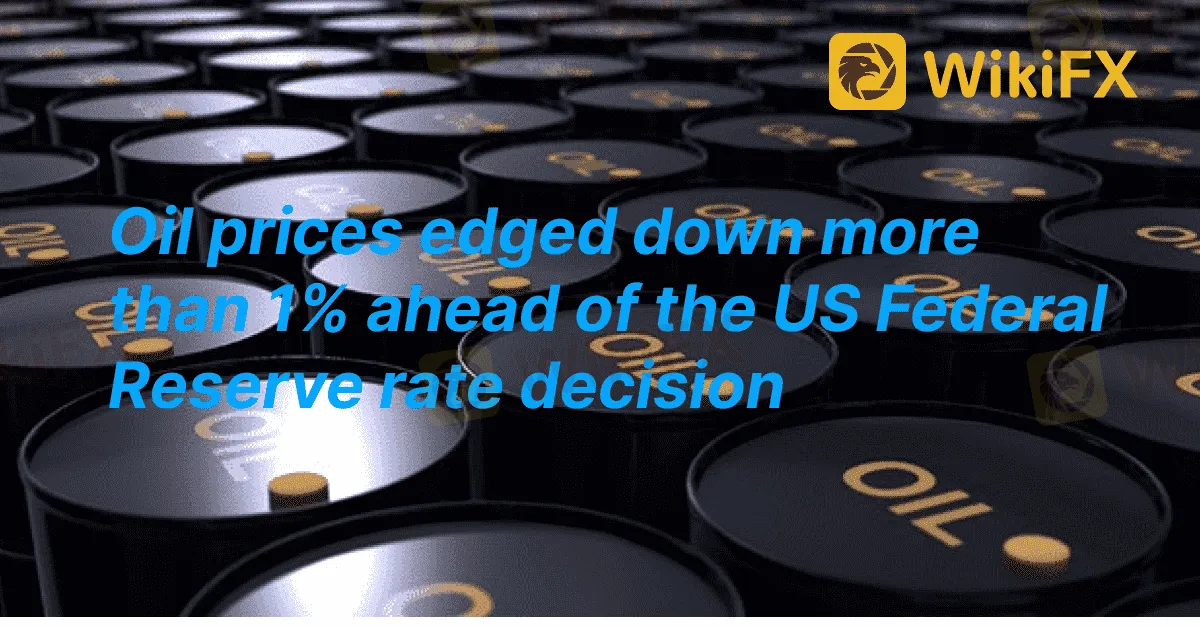简体中文
繁體中文
English
Pусский
日本語
ภาษาไทย
Tiếng Việt
Bahasa Indonesia
Español
हिन्दी
Filippiiniläinen
Français
Deutsch
Português
Türkçe
한국어
العربية
Oil prices edged down more than 1% ahead of the US Federal Reserve rate decision
Abstract:According to the report, Brent crude futures experienced a decline of 97 cents, equivalent to a 1.3% drop, reaching $73.82 per barrel by 0437 GMT. Similarly, U.S. West Texas Intermediate (WTI) crude also fell by 1.3% to $69.24 per barrel.

According to the report, Brent crude futures experienced a decline of 97 cents, equivalent to a 1.3% drop, reaching $73.82 per barrel by 0437 GMT. Similarly, U.S. West Texas Intermediate (WTI) crude also fell by 1.3% to $69.24 per barrel.
Last week, both benchmarks recorded their second consecutive weekly decrease due to concerns about demand growth in China, the world's largest crude importer. Disappointing economic data from China offset the positive impact of Saudi Arabia's commitment to cutting production by 1 million barrels per day (bpd) in July.
On Monday, oil prices declined as investors anticipated the U.S. Federal Reserve meeting to assess the central bank's stance on further interest rate hikes. Additionally, worries about China's fuel demand growth and the increasing supply of Russian crude weighed on the market.
In a note, Francisco Blanch from Bank of America Global Research described the current situation as a clash between bearish asset allocators, who highlight monetary contraction, and bullish oil speculators who anticipate lower inventories in the second half of 2023. Blanch believes that the bearish allocators will maintain dominance until the Fed eases money supply. Nonetheless, Bank of America still predicts that Brent crude will average around $80 per barrel in 2023.
The rate hikes by the U.S. Federal Reserve have strengthened the value of the U.S. dollar, making commodities priced in dollars more expensive for holders of other currencies. This has contributed to the downward pressure on oil prices.
Most market participants expect the U.S. central bank to maintain interest rates at their current levels following the conclusion of its two-day monetary policy meeting on Wednesday.
In a note, Morgan Stanley economist Seth Carpenter expressed the belief in a soft landing for the U.S. economy but cautioned that policy could tighten further if growth fails to slow down and if there are funding pressures in the banking system. Carpenter stated that these factors continue to pose risks skewed to the downside.
Regarding the supply side, while Saudi Arabia has reduced oil production four times over the past year, Russian supply has remained steady due to the strategic implementation of sanctions, which had a limited impact on output. Despite the European Union's embargo and the Group of Seven's price cap mechanism, Russian oil exports to China and India have continued to grow.
Goldman Sachs has revised its oil price forecasts downward due to higher-than-expected supplies from Russia and Iran. The bank also increased its 2024 supply forecasts for these two producers and Venezuela, adding a total of 800,000 bpd. Consequently, Goldman Sachs' December crude price projections now stand at $86 per barrel for Brent, down from $95, and at $81 per barrel for WTI, down from $89.

Disclaimer:
The views in this article only represent the author's personal views, and do not constitute investment advice on this platform. This platform does not guarantee the accuracy, completeness and timeliness of the information in the article, and will not be liable for any loss caused by the use of or reliance on the information in the article.
Read more

OctaFX Flagged by Malaysian Authorities
OctaFX has been officially listed on warning lists by both Bank Negara Malaysia (BNM) and the Securities Commission Malaysia (SC). These alerts raise serious concerns about the broker’s status and whether it is legally allowed to operate in Malaysia.

TradingPRO: A Closer Look at Its Licences
In an industry where safety and transparency are essential, the regulatory status of online brokers has never been more important. For traders seeking to protect their capital, ensuring that a platform operates under recognised and stringent oversight can make all the difference. Keep reading to learn more about TradingPRO and its licenses.

Oil Price Breakout Incoming? Investors Should Stay Alert
Oil prices are hovering around a critical level, with potential yet to be fully unleashed. Investors must prepare for sudden changes.

New SEBI Regulations on Intraday Trading
The Securities and Exchange Board of India (SEBI) has implemented revised regulations on Intraday trading, with effect from November 20, 2024. These regulations are meant to lessen risks and prevent speculative trading practices.
WikiFX Broker
Latest News
SkyLine Guide 2025 Malaysia: 100 Esteemed Judges Successfully Assembled
Vantage Markets Review 2025: Trusted Forex and CFD Trading Since 2009
Why STARTRADER Is Popular Among Traders?
A Guide to Intraday Forex Trading You Can't Miss Out
CONSOB Blocks Access to 13 Unauthorized Investment Websites
TradingPRO: A Closer Look at Its Licences
The world could be facing another ‘China shock,’ but it comes with a silver-lining
New SEBI Regulations on Intraday Trading
Everything You need to know about Barath Trade
IronFX Broker Review 2025: A Comprehensive Analysis of Trustworthiness and Performance
Currency Calculator


